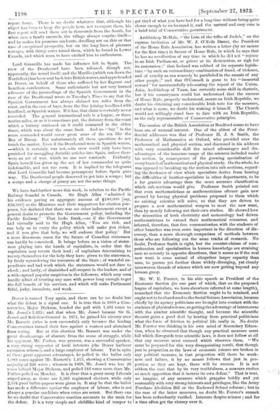The session of the British Association at Bradford seems to
have- been one of unusual interest. One of the ablest of the Presi- dential addresses was that of Professor H. J. S. Smith, the- Professor of Mathematics at Oxford, who presided over the mathematical and physical section, and discussed in his address with very considerable skill the mixed advantages and dis- advantages of the immense range of the sciences included under his section, in. consequence of the growing specialisation of every branch of mathematical and physical study. On the whole, he was opposed to breaking up the section into sub-sections, regard- ing the freshness of view which specialists derive frem hearing the difficulties of brother-specialists in other departments, to be- a far greater advantage than the more accurate classification which sub-sections would give. Professor Smith pointed out that even mathematicians as mathematicians oftener gain new ground by having physical problems proposed to them which no existing calculus will solve, so that they are driven to. prepare a new mathematical weapon to meet the new want, than by merely following out their own studies. He showed how the necessities of both electricity and meteorology had driven mathematicians to extend their mathematical resources, and inferred, therefore, that free communication with the students of other branches was even more important in the direction of dis- covery, than a more thorough comparison of methods between those who are following out the' same tracks of research. No' doubt, Professor Smith is right, but the counter-claims of cont- prehension and specialisation in human knowledge are straining- men so severely in opposite directions, that it seems as if the real new want is some animal of altogether larger capacity than, man, to pursue yet further those widely-diverging, yet closely interwoven threads of science which are now getting beyond any- human grasp.


































 Previous page
Previous page